.jpg?width=300&name=65bc09b81a508b2d839bf7ee_intro%20header%20image%20(1).jpg)
Our Path to Impact
2024-2025 Impact Report
We are on a mission to help leaders turn good intentions into positive impact. Advancing meaningful change has always been part of our DNA, and much of our work focuses on reducing equity gaps and driving impact at scale. But social progress takes time and patience. Sometimes it can be hard to see the light at the end of the tunnel. It’s important to celebrate the small wins on the path to greater change. This year’s impact report is dedicated to the incremental steps we’re taking, the micro-adjustments we’re making, and the leveled-up commitments we hold ourselves to. While on our journey to be the most impactful consultancy we can, we hope to inspire and be inspired by others along the way.
2023 Impact Report
Our
Mission

Our
Vision

We hold ourselves and the work we do to high standards. At iF, we believe that the world’s most complex societal problems require creative and collaborative approaches to drive systems change at scale. As a Certified B Corp consultancy, we recognize the ripple effect that our actions have on our people, our clients, our communities, and our planet. We strive to adopt a mindset of abundance by creating shared value for our stakeholders in everything that we do. To hold ourselves accountable to our mission, we strive to make progress against the following goals and have developed a rubric to assess how we’re doing year-to-year:
iF Impact Goals:
People: Scale equity-centered approaches.
We commit to centering our projects and clients around antiracist beliefs, policies, and practices which drive more equitable outcomes.
Planet: Prioritize sustainable solutions.
We commit to choosing products, partners, and projects which reduce unnecessary waste and promote long-term, regenerative models.
Community: Create with, not for, community.
We commit to co-designing solutions with those who are directly impacted by the problem and who have the greatest need for change.
Our 1-3 Level Rubric Scores:
Centered: Approaches were central to the project's trajectory and outcomes woven in throughout the entire project lifecycle.
Considered: Was considered at times throughout the project, but was not central to the project outcomes.
Agnostic: Was not a central part of the project trajectory and/or outcomes.
Our story is unfinished. We have much to learn and so many new challenges to tackle. This impact report is an open reflection of our shared commitments and progress over the past year, as well as the gaps and goals we’re working towards. Through this effort, we hope to look back with pride at what we have accomplished, rather than regret at what we failed to do.
People
Centering on the voices and experiences of those most in need

Leveraging AI for Equity in K-12
Equal Opportunity Schools
Challenge: Despite decades of reform and advocacy, students of color, low-income students, and students with historically marginalized identities continue to be underserved by the American public school system. For over a decade, Equal Opportunity Schools (EOS) has partnered with school leaders and staff to enhance access to advanced courses—such as AP and IB classes—addressing root causes that contribute to widespread inequity. With the availability of generative AI platforms like ChatGPT, a growing discourse on AI's implications and potential applications in education has emerged. EOS recognized the need to explore and understand if and how AI can be employed as a tool to foster and scale equity in K-12 schools.
Approach: EOS collaborated with iF to comprehend the current state of AI and its utilization in education, evaluating potential use cases that could aid EOS in expanding its impact. We conducted research, engaged experts in education, technology, and philanthropy, and worked with the EOS team to assess the current state of AI in education while generating ideas for potential AI use cases. Additionally, we partnered with EOS to develop a rubric to evaluate potential AI uses against ethics, EOS values and priorities, and current education and market conditions.
Impact at Scale: Our collaboration with EOS laid a foundation for the organization as it explores future pathways to incorporate AI as a tool for scaling equity. Our work ensures that equity and key ethical considerations, such as environmental impact, are considered proactively. The impact anticipated is not only to be exciting but also meaningful and measurable, influencing students' lives and encapsulating the essence of EOS's commitment to equity.
Equity Centered
Sustainability Considered
Community Considered

Transforming Education Through Public Goods
CommonLit
Challenge: CommonLit, a teacher-serving educational organization, faced an urgent need: to expand educational support in underserved areas. They needed a plan to intentionally scale their efforts, starting with a successful Randomized Control Trial (RCT), to unlock long-term success of national district recruitment and adoption.
Approach: CommonLit teamed up with iF to embark on a transformative journey. The collaborative effort aimed to provide a comprehensive district recruitment guide, a detailed timeline, and a project management plan tailored to CommonLit's mission. The innovative twist involved leveraging emerging technology, specifically an Airtable interface, to create a dynamic, state-to-state comparison dashboard. This interface included crucial data points, such as student demographics, access to technology, LGBTQ+ and culturally inclusive curricula requirements, all presented in a filterable dashboard for maximum insight.
Impact at Scale: The result of this collaboration proved to be a game-changer for CommonLit. The recruitment guide, plan, and interface empowered them to conduct a successful RCT and recruitment, setting the stage for nationwide scaling of their curriculum product. This work resulted in the creation of two valuable public goods: a recruitment plan focused on best practices for district recruitment, and a public version of the Airtable dashboard.
Equity Centered
Sustainability Considered
Community Considered

Exploring Open-Source Solutions for Global Impact
Bill & Melinda Gates Foundation
Challenge: Covid-19 underscored digital infrastructure disparities; digitized nations efficiently provided funds and services to their citizens, while others struggled. To address global digitization needs, BMGF previously invested in open-source digital public goods like Mojaloop and MOSIP. Recognizing limited awareness of Digital Public Infrastructure (DPI), the Intentional Futures team was enlisted to unify understanding and explore leveraging DPI for societal benefits, such as remote learning, telehealth services, and rendering relief funds.
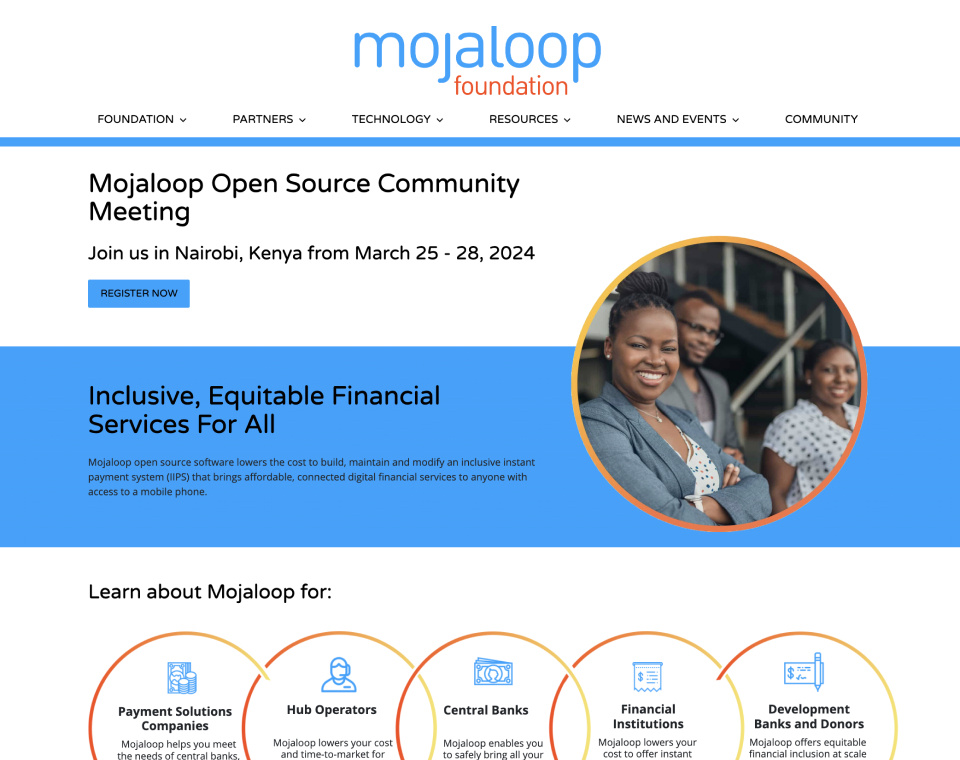
Approach: We researched global digital solutions, focusing on India, Estonia and Singapore as benchmarks. We interviewed experts from Brazil, Germany, Nigeria, France, India, and the United States for a holistic perspective, avoiding bias towards developed nations in addressing the needs of developing ones. We engaged in iterative brainstorming sessions with BMGF stakeholders from various departments, enhancing our understanding of the topic through multiple rounds of collaboration.
Impact at Scale: As a project with a global impact, the effects of DPI build-outs will be realized in the coming years.
Equity Centered
Sustainability Considered
Community Considered

Co-designing the Employee Experience from the Inside Out
MOD Pizza
Challenge: Each year, 650,000 individuals exit the criminal justice system. One of the key indicators for a successful re-entry is employment, but finding employment can be challenging — many employers aren’t willing to overlook prior missteps. MOD Pizza believes you’re defined not by your past, but by what you do next. So much so that over 25% of their workforce are formerly incarcerated employees. MOD leveraged their purpose-driven culture to become one of the fastest growing restaurant brands in the US. However, success brought challenges, including how to effectively scale their culture in the midst of rapid growth. iF was asked to help them design a blueprint to activate their core values and embed them into the daily store experience to improve employee engagement and retention.
Approach: We partnered with MOD’s People Team to help them understand what systems were in place to nourish their culture and what opportunities existed to improve it. We guided the team in mapping exercises that helped them engage in authentic dialogue about which practices were creating fulfillment and which were creating harm. We also enlisted team members to create for themselves daily team rituals, routines, storytelling and symbols that would build shared meaning with the core values. By centering team members as the creators, we built a blueprint to activate core values that would respect the unique culture of each store and unify them around a set of shared beliefs and behaviors.
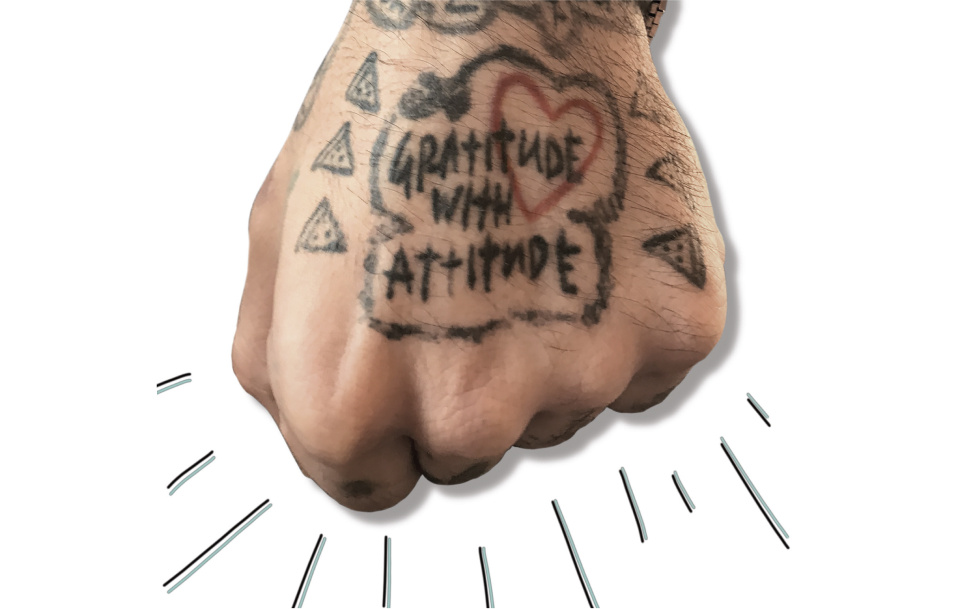
Impact at Scale: Team members possessed actions they could implement immediately, as well as plans to integrate the lessons learned into their 2024 people strategy, which included:
- A system to invite team members to assess and generate their own rituals, routines, stories, and symbols to bring their core values to life
- New practices that were agreed upon and ready for adoption
- A method for developing people and leaders as workplace culture-curators
Equity Centered
Sustainability Considered
Community Considered
Planet
Activating teams to adopt regenerative solutions at
scale

Building a Livable and Just Future with Green Accountability
World Bank GPSA
Challenge: The climate crisis threatens all of us, and the climate finance ecosystem is rapidly emerging to meet the need of the global challenges associated with the climate crisis. Citizens have historically been distanced from climate decisions despite the impact they have on daily lives. If communities are one again left out of climate action and finance decisions, the climate finance ecosystem could continue to lack transparency, accountability, participation, and equity.
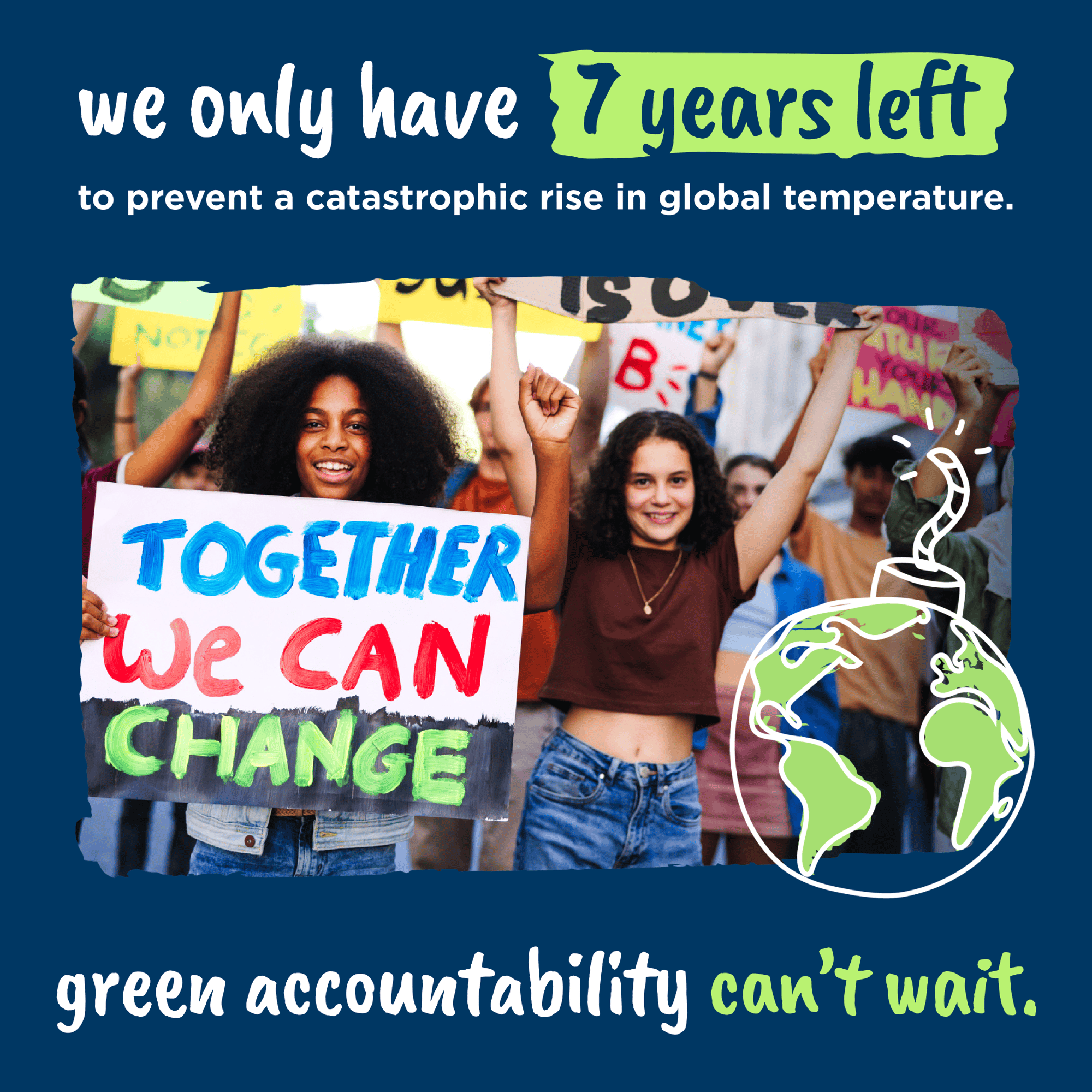
Approach: We partnered with the Global Partnership for Social Accountability (GPSA), World Bank to launch the Green Accountability Initiative to help citizens engage in and monitor climate action and finance in their communities. This initiative was an early pioneer for the concept of green accountability. We shaped the launch to introduce and garner momentum around this new term. We tailored the look and feel of the initiative to the target audiences and helped craft key asks for individuals, partners, and donors. Through the initiative launch, we were also able to lay the groundwork for the GPSA to rebrand in the upcoming months by incorporating elements that would become evergreen to their updated vision.
Impact at Scale: The green accountability platform offers a network of learning and innovation in an effort to foster climate finance accountability. Through the pilot sub-granting model, the initiative is providing flexible, accelerated, and targeted civil society organization financing in selected countries. This innovative funding model is the first step toward promoting transparency, accountability, and participation in the climate sector.
Equity Centered
Sustainability Considered
Community Considered

Harnessing Creative Philanthropy for the Circular Economy
gDiapers
Challenge: gDiapers, a pioneering startup known for producing the only diaper designed to meet national composting standards, partnered with us in 2022. We profiled them in our 2022 Impact Report and are happy to report back on their efforts once again. Their vision garnered immense support and momentum from prominent development funders, including the World Bank. However, in 2023, they faced a significant hurdle in securing transformational funding despite this widespread and global support. This challenge prompted the need for a unique fundraising strategy to propel their startup and its innovative compostable diaper solution forward.
Approach: To tackle the funding challenge, gDiapers adopted a creative approach which iF had suggested earlier. They harnessed their own network and the thriving circular economy landscape to fuel massive philanthropic support. This approach led them to embark on a unique fundraising journey, stepping forward with their nonprofit to acquire the necessary funds. The ultimate goal was to be well-prepared for a critical date in 2024, demonstrating the efficacy of the gDiapers brand through a significant project in Samoa.
Impact at Scale: As we eagerly await the unfolding impact, gDiapers has already embarked on a transformative journey. By tapping into the philanthropic efforts of hundreds of supporters from around the world, gDiapers has already initiated their groundbreaking project in Samoa to be prepared for their vital future date. The project in Samoa serves as a tangible manifestation of their commitment to creating a positive and sustainable impact on a global scale.
Equity Centered
Sustainability Considered
Community Considered

Empowering LMICs Through Inclusive Finance Models
Bill & Melinda Gates Foundation
Challenge: In the digital finance realm, LMICs face barriers to access to digital financial services broadly and equitably in ways that are affordable, safe, and can be flexibly deployed and utilized by local ecosystems.
Approach: Leveraging Mojaloop, an open-source Instant and Inclusive Payment Solution (IIPS), we helped create the conditions for support of digital finance solutions and productive conversations with LMIC decision-makers. This helped stakeholders consider the right information to make the most responsible choices for their people and local companies. Mojaloop, with reduced ownership costs, acts as a global catalyst, reshaping communities and shielding LMICs from predatory vendor practices.
Impact at Scale: Our collaboration on the internal strategy, external stakeholder engagement, and tool creation resulted in support for three additional deployments by the end of 2024, sustaining much needed global momentum. Together, we assured that Mojaloop has the resources to meet countries where they are and provide an offering that is financially sustainable for governments and useful to its people. As equity and community are at the forefront of financial inclusion, these were essential to our approach. Meanwhile, while our belief is that open-source IIPS are more ecologically minded, this ideal was not core to our approach.
Equity Centered
Sustainability Considered
Community Considered
Community
Designing solutions with the communities they
serve

Harnessing AI for Good
Microsoft Tech for Social Impact (TSI)
Challenge: There are more than 10M active nonprofits around the world today and many are facing widespread talent and funding shortages. Nonprofits across all geographies and mission types need digital transformation in order to drive impact at scale, however most do not have the time, skills, and resources to put towards it.

Approach: We partnered with Microsoft’s Tech for Social Impact (TSI) team to conduct research exploring how AI can help nonprofits around the world. We engaged 136 nonprofit organizations to map common pain points and jobs for AI across key personas. We also built a taxonomy and rubric to prioritize AI solutions with the greatest potential value for nonprofits.
Impact at Scale: This work illuminated how AI can enable nonprofits to better serve their mission and have a greater impact in the communities they serve.
Equity Centered
Sustainability Considered
Community Considered

Reflecting on the Present and Dreaming About the Future
Lakeside School
Challenge: Lakeside School engaged iF to lead their 3-5 year strategic planning process. The leadership team knew that this couldn’t be a top down process, it needed to be a highly intentional and participatory approach. We brought together students, faculty and staff, and parents and guardians to dream about the future of Lakeside together. Lakeside’s values are centered around inclusion and belonging, and in gathering community feedback, the school also asked us to consider how it might deepen its commitment to student mental health, consider emerging technologies, and double down on the best parts of what make them who they are.
Approach: We have completed two of three phases thus far, both focused on heavy community research and synthesis. In our first phase, we conducted surveys, focus groups, and interviews with students, parents/guardians, employees, and board members to develop a comprehensive understanding of Lakeside today. In phase 2, we facilitated a series of “dreaming sessions” with the same set of internal stakeholders to define the vision for the future of Lakeside.
Impact at Scale: Thus far, Lakeside community members have been excited to be a part of such an exciting—and challenging—process.
Equity Centered
Sustainability Considered
Community Considered
2023
Summary
Wrapping Up and Looking Ahead…
We scored all the projects we did in 2023 to see how well we’re stacking up against our impact goals. The following pie charts are a reflection of progress made as well as remaining gaps in our efforts to be more equity/sustainability/community-centered through our work.
How many of our projects last year scaled equity-centered approaches?

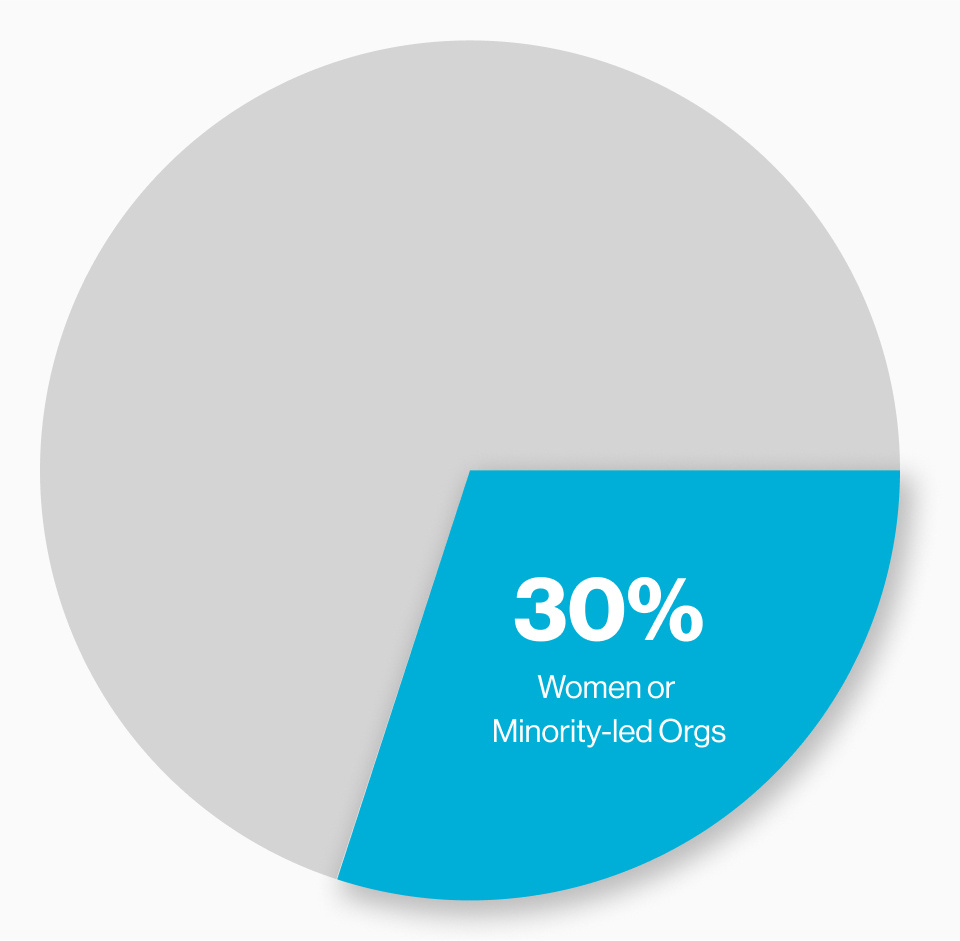
How many of our projects last year prioritized environmentally sustainable solutions?
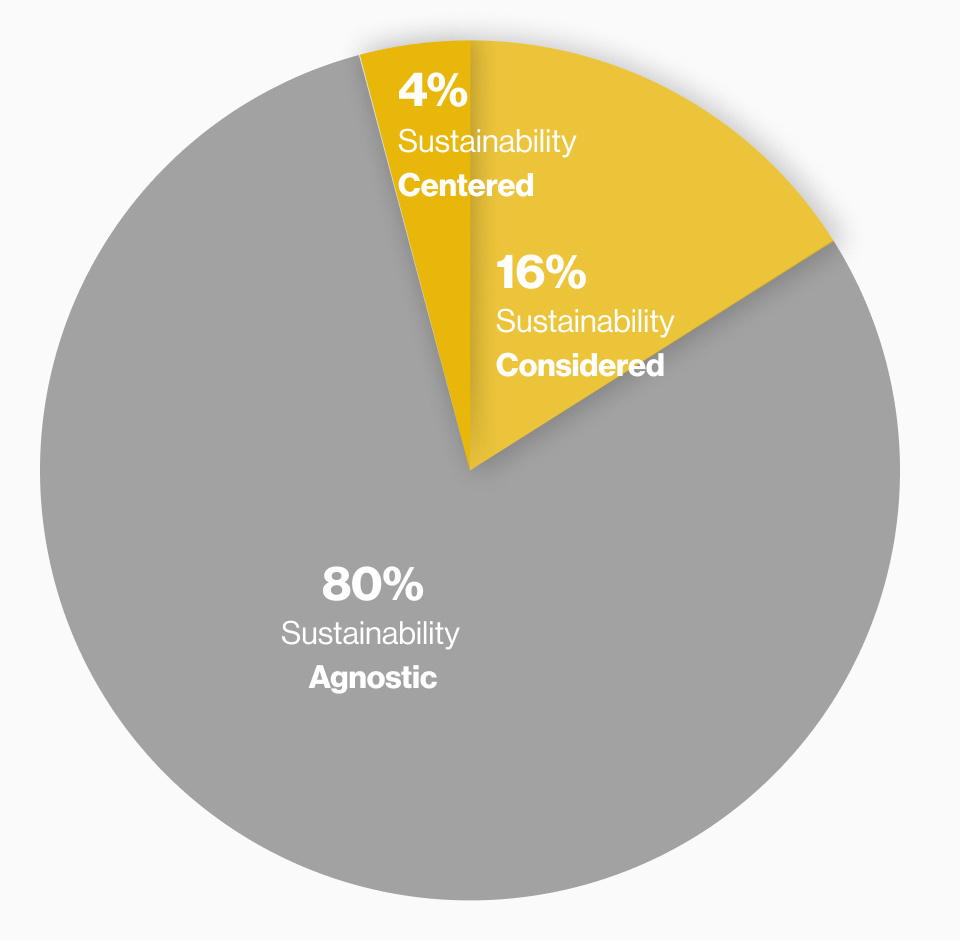

How many of our projects last year were created with, not for, the communities they serve?
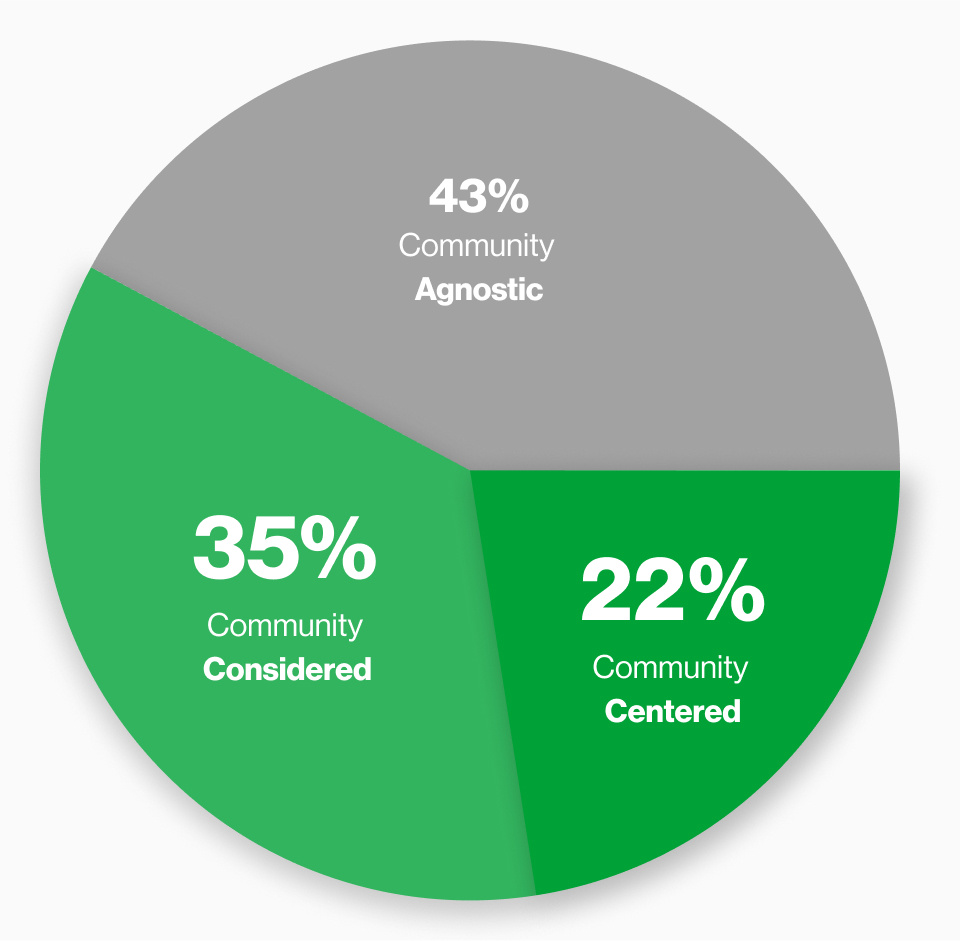

As we head into 2024, we are set on ensuring our work has real, measurable positive impacts on people's lives and livelihoods.
Our ambition is to come away from this year with a greater portfolio of high impact work which centers equity, sustainability, and community through novel approaches that serve real needs.


.png)